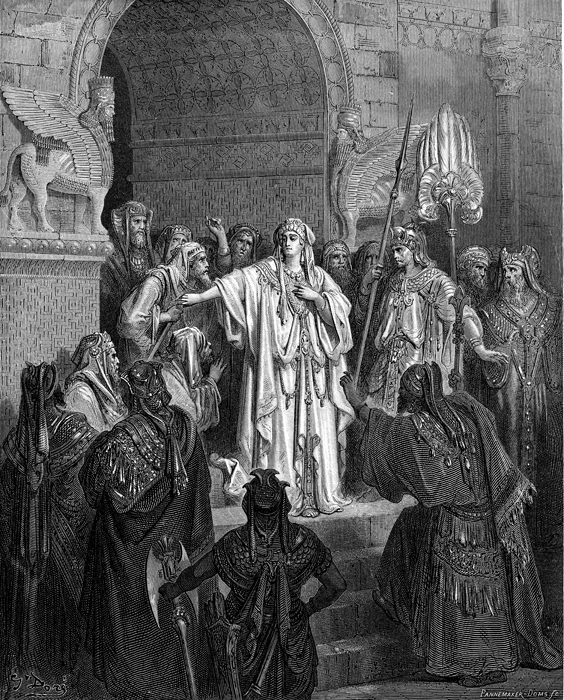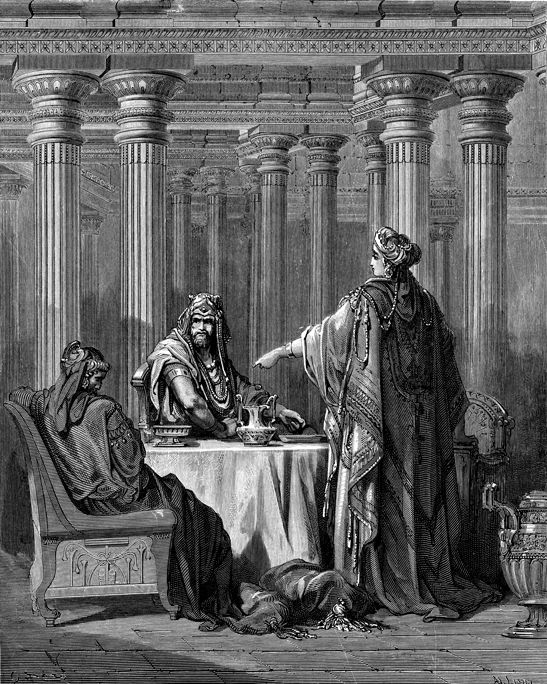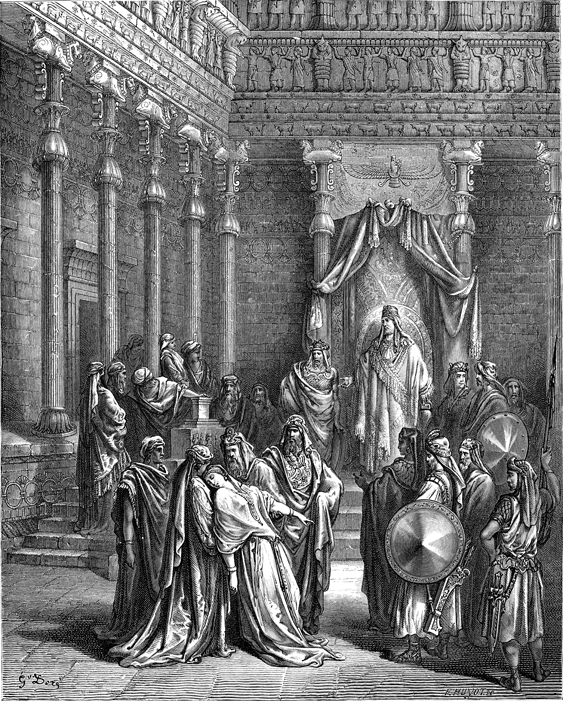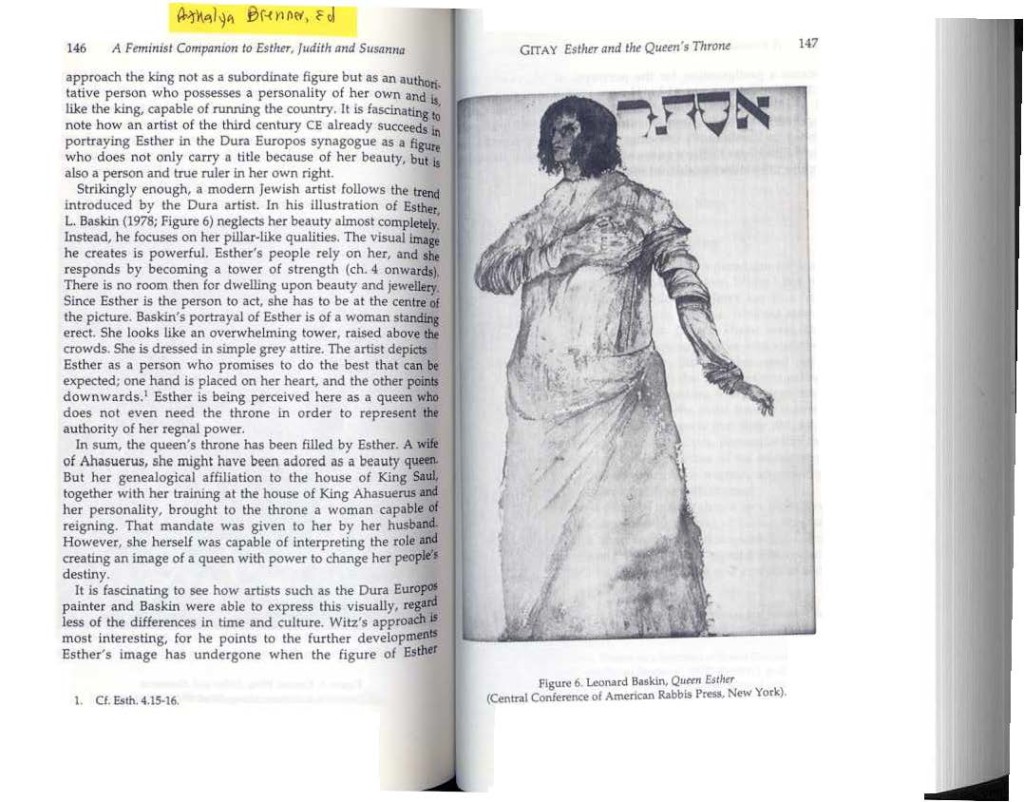Parasha Ki Tisa is a Song of both longing and danger. First, the longing. Previous to our parsha, Moses has gone up to the top of Mount Sinai, entering the cloud of God’s presence, to remain with God for 40 days (Ex 24:18). While Moses is up on Mount Sinai encountering the Divine, the children of Israel wait expectantly at the foot of Mount Sinai for Moses to return with God’s prescription for a holy life.
Now the period of time is coming to an end and the people are restless, “for this Moshe, the man who brought us up from the land of Egypt, we do not know what has become of him!” (Ex 32.1 Everett Fox translation). They go to Aaron, brother of Moses, and say to him, “Make us a god who will go before us!” (Ex 32.1 Everett Fox translation). There follows the well-known story of the creation of the golden calf from the gold rings of the people, and of the people eating, drinking, and dancing wildly around their creation.
I would like to read the creation of the golden calf as the story of people who are yearning for God’s presence, and who do the best they can in their circumstances to fill that longing. But there is a problem with this reading, and that is where the danger comes it. Although Moses successfully pleads with God not to destroy the people entirely (Ex. 32:31-34), nevertheless God sends a plague upon the people (Ex. 32:35). Moses himself orders the Levites to assassinate 3,000 of the Israelites. (Ex. 32:26-28). If the people were expressing longing for God, how do we understand a world in which they can be punished for doing so?
We can illuminate the Exodus text by following the ancient rabbinic tradition of reading Torah intertextually with Song of Songs. But fair warning, the Song illuminates the danger as well as the longing.
Exodus shows us that the people bear witness to the awesome and physical presence of God on Mt. Sinai, to thunder, smoke, lightening, and shofar blasts when God reveals God’s commandments (Ex. 19:16-20:18). Aviva Zornberg says “At the moment when God spoke at Sinai, a whole nation lost consciousness and regained it.” (The Murmering Deep, pg 246). She quotes from Shemot Rabbah 29:3, which incidentally provides a good illustration of how the rabbis read Song of Songs with the Torah.
Levi said: Israel asked of God two things – that they should see His glory and hear His voice; and they did see His Glory and hear His voice, for it says, “And you said: Behold, God has shown us His glory and His greatness, and we have heard His voice out of the midst of the fire” (Deut. 5.21). But they had no strength to endure it, for when they came to Sinai and God revealed Himself to them, their souls took wing because He spoke with them, as it says, “My soul left me when he spoke” (Songs 5:6).
Zornberg suggests that the people are destabilized by “the shock of God’s voice.” Their souls have left them. And in this destabilized condition, it appears to them that Moses has left them too. Moses has learned from God that it will be possible (and necessary) for the Israelites to build a sanctuary, so that God may dwell amongst them. Ve-asu li mikdash, Ve-shachanti be-tocham. (Ex. 25.8). But the people do not yet know about a Mikdash where God’s Shekhina שְׁכִינָה can dwell amongst them shachanti שכנתי. Their souls have left them, and Moses has left them. They erect the golden calf.
When Moses descends from Sinai, the the Israelites are dancing around the calf. Joshua tells Moses that he hears the cry of war (kol milchamah). However, Moses hears (Ex 32:18, translation Robert Alter)
Not the sound of crying out in triumph,
and not the sound of crying out in defeat.
A sound of crying out I hear.
Moses hears the people simply crying out, neither triumphant nor defeated. I read this as the people crying out from their souls, for God’s presence. This may remind us of Hannah’s prayer:
I pour my soul out before YHWH וָאֶשְׁפֹּךְ אֶת-נַפְשִׁי, לִפְנֵי יְהוָה. Sam 1:15).
Like R. Levi, we can read Song of Songs with the Torah, but we read a little further in the verse and discover how the singer felt when her soul left her, how she sought but could not find her lover, as the Israelites sought and could not find Moses or God. In Chapter 5, the singer is called to the door by her beloved, but hesitates, and then:
I opened to my beloved; but my beloved had turned away, and was gone. My soul failed me [left me] when he spoke. I sought him, but I could not find him; I called him, but he gave me no answer. (Song 5:6)
As the lover called out, so too the Israelites call out with “the sound of crying out.” They don’t yet know about building a Mikdash, so they gravitate to the one thing which they know about that might bring God’s presence – the golden calf. In this reading, they do not have intent to blaspheme, to worship idols, or to turn against their God. Yet, if they are expressing their longing for God in creating the golden calf, it seems harsh that they must be punished. Is it for lack of faith? It still seems harsh, yet very much like a reflection of the real world.
Listen to the Song in conjunction with the punishment of people at Sinai:
And he [Moses] said unto them: ‘Thus says YHWH, the God of Israel: Put ye every man his sword upon his thigh, and go to and fro from gate to gate throughout the camp, and slay every man his brother, and every man his companion, and every man his neighbor. And the sons of Levi did according to the word of Moses; and there fell of the people that day about three thousand men. (Ex. 32:26-28).
And YHWH smote the people, because they made the calf, which Aaron made (Ex. 32:35).
Immediately after the singer of the Song laments over not finding her lover, the next verse says:
The watchmen that go about the city found me, they smote me, they wounded me; the keepers of the walls took away my mantle from me. (Song 5:7)
Who are these watchmen? It is surely dangerous to walk about the city when the very guardians of public safety are liable to beat the walker. Is the walker in a dream? Is she beaten because she is dreaming? Because she is yearning? Because the search she conducts for her lover does not fit with the societal norms of male pursuing female? The moment when the singer of the Song is beaten by the watchman, and the moment when the children of Israel are punished by God (and by Moses), are awe-full moments. Their hearts were full of longing, and then, wham! There are other, and plentiful, times of joy, of success in finding. But punishments are troubling and remind us that the world, then and now, is not always a safe place in which to be out and to follow one’s heart.
Here is the text of Song 5:2-8 in its entirety.
| אֲנִי יְשֵׁנָה, וְלִבִּי עֵר; קוֹל דּוֹדִי דוֹפֵק, פִּתְחִי-לִי אֲחֹתִי רַעְיָתִי יוֹנָתִי תַמָּתִי–שֶׁרֹּאשִׁי נִמְלָא-טָל, קְוֻצּוֹתַי רְסִיסֵי לָיְלָה. |
2 I sleep, but my heart waketh; Hark! my beloved knocketh: ‘Open to me, my sister, my love, my dove, my undefiled; for my head is filled with dew, my locks with the drops of the night.’ |
| ג פָּשַׁטְתִּי, אֶת-כֻּתָּנְתִּי–אֵיכָכָה, אֶלְבָּשֶׁנָּה; רָחַצְתִּי אֶת-רַגְלַי, אֵיכָכָה אֲטַנְּפֵם. |
3 I have put off my coat; how shall I put it on? I have washed my feet; how shall I defile them? |
| ד דּוֹדִי, שָׁלַח יָדוֹ מִן-הַחֹר, וּמֵעַי, הָמוּ עָלָיו. |
4 My beloved put in his hand by the hole of the door, and my heart was moved for him. |
| ה קַמְתִּי אֲנִי, לִפְתֹּחַ לְדוֹדִי; וְיָדַי נָטְפוּ-מוֹר, וְאֶצְבְּעֹתַי מוֹר עֹבֵר, עַל, כַּפּוֹת הַמַּנְעוּל. |
5 I rose up to open to my beloved; and my hands dropped with myrrh, and my fingers with flowing myrrh, upon the handles of the bar. |
| ו פָּתַחְתִּי אֲנִי לְדוֹדִי, וְדוֹדִי חָמַק עָבָר; נַפְשִׁי, יָצְאָה בְדַבְּרוֹ–בִּקַּשְׁתִּיהוּ וְלֹא מְצָאתִיהוּ, קְרָאתִיו וְלֹא עָנָנִי. |
6 I opened to my beloved; but my beloved had turned away, and was gone. My soul failed me when he spoke. I sought him, but I could not find him; I called him, but he gave me no answer. |
| ז מְצָאֻנִי הַשֹּׁמְרִים הַסֹּבְבִים בָּעִיר, הִכּוּנִי פְצָעוּנִי; נָשְׂאוּ אֶת-רְדִידִי מֵעָלַי, שֹׁמְרֵי הַחֹמוֹת. |
7 The watchmen that go about the city found me, they smote me, they wounded me; the keepers of the walls took away my mantle from me. |
| ח הִשְׁבַּעְתִּי אֶתְכֶם, בְּנוֹת יְרוּשָׁלִָם: אִם-תִּמְצְאוּ, אֶת-דּוֹדִי–מַה-תַּגִּידוּ לוֹ, שֶׁחוֹלַת אַהֲבָה אָנִי. |
8 ‘I adjure you, O daughters of Jerusalem, if ye find my beloved, what will ye tell him? that I am love-sick.’ |




